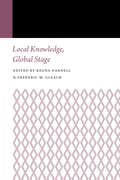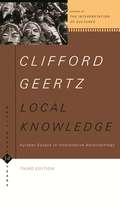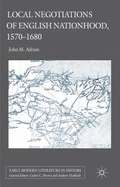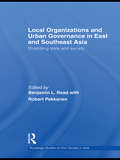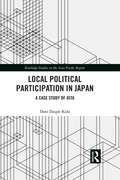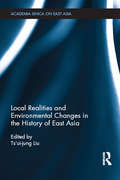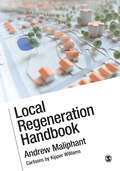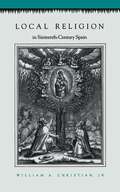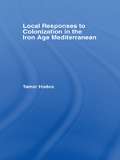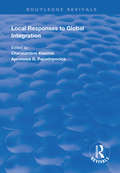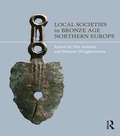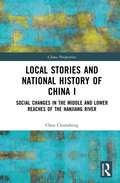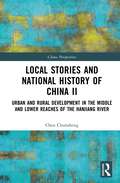- Table View
- List View
Local Invisibility, Postcolonial Feminisms: Asian American Contemporary Artists In California (Critical Studies In Gender, Sexuality, And Culture Ser.)
by Laura FantoneThis book offers gendered, postcolonial insights into the poetic and artistic work of four generations of female Asian American artists in the San Francisco Bay Area. Nancy Hom, Betty Kano, Flo Oy Wong, Trinh T. Minh-ha, Theresa H.K. Cha, and Hung Liu are discussed in relation to the cultural politics of their time, and their art is examined in light of the question of what it means to be an Asian American artist. Laura Fantone’s exploration of this dynamic, understudied artistic community begets a sensitive and timely reflection on the state of Asian American women in the USA and in Californian cultural institutions.
Local Journalism and Local Media: Making the Local News
by Bob FranklinThe local media - local newspapers and radio, regional television, cable television and local news on the internet - represents a diverse and rapidly-changing sector of the British media landscape. Bringing together media academics, local journalists and other media professionals, this text presents a thorough, up-to-date and authoritative account of recent developments and future prospects for Britain's local newspapers, local media and local journalism. Drawing on current research and relevant literature, the book covers: *key developments in the local media scene*the distinctive editorial format of local newspapers*news sources and other sources available to local journalists*recent developments in media policy*online journalism*ethics and regulations*the impact of new technology. Situating the study within the context of local, national and multi-national media networks, this unique text provides students with a well-written and wide-ranging assessment of all aspects of the local media in the UK and as such, will be a welcome addition to the current literature.
Local Journalism: Critical Perspectives on the Provincial Newspaper
by Rachel Matthews and Guy HodgsonLocal Journalism investigates the range of meanings associated with the ‘local newspaper’ and considers how digital technology has disrupted the fabric of the local news industry. Divided into two parts, this book first provides a theoretical account of how normative meanings associated with the local newspaper have been challenged by the impact of digital technology and then goes on to explore these questions via case studies drawn from a variety of contexts including the US, Ireland, Denmark, the UK and Spain. It suggests three thematic ways of understanding the role of the legacy local newspaper in a post-digital environment, namely as an information provider, commercial entity and community champion. While much scholarship talks of their demise, this book argues for a more nuanced understanding of the local newspaper and its continued significance to people, places and commercial interests. Local Journalism will benefit students, academics and researchers in the areas of journalism, media studies and sociology.
Local Knowledge, Global Stage (Histories of Anthropology Annual)
by Regna Darnell Frederic W. GleachThe Histories of Anthropology Annual presents localized perspectives on the discipline’s history within a global context, with a goal of increasing awareness and use of historical approaches in teaching, learning, and conducting anthropology. This tenth volume of the series, Local Knowledge, Global Stage, examines worldwide historical trends of anthropology ranging from the assertion that all British anthropology is a study of the Old Testament to the discovery of the untranslated shorthand notes of pioneering anthropologist Franz Boas. Other topics include archival research into the study of Vancouver Island’s indigenous languages, explorations of the Christian notion of virgin births in Edwin Sidney Hartland’s The Legend of Perseus, and the Canadian government’s implementation of European-model farms as a way to undermine Native culture. In addition to Boas and Hartland, the essays explore the research and personalities of Susan Golla, Claude Lévi-Strauss, and others.
Local Knowledge: Further Essays in Interpretive Anthropology
by Clifford GeertzIn essays covering everything from art and common sense to charisma and constructions of the self, the eminent cultural anthropologist and author of The Interpretation of Cultures deepens our understanding of human societies through the intimacies of "local knowledge. " A companion volume to The Interpretation of Cultures, this book continues Geertz's exploration of the meaning of culture and the importance of shared cultural symbolism. With a new introduction by the author.
Local Lives: Migration and the Politics of Place (Studies in Migration and Diaspora)
by Brigitte Bonisch-BrednichLocal Lives contests dominant trends in migration theory, demonstrating that many migrant identities have not become entirely diasporic or cosmopolitan, but remain equally focused on emplaced belonging and the anxieties of being uprooted. By addressing the question of how migrants legally and symbolically lay claim to owning and belonging to place, it refocuses our attention on the micro-politics and everyday rituals of place-making, that are central to the construction of migrant identities. Exploring immigrants' interactions with house spaces, property rights, environmental conservation, landscape, historical knowledge of place, ideas of 'local community' and place-specific 'traditions', this volume shows how, in a fluid world of movement, locality remains a deeply contested and symbolically rich place to situate identity and to constitute the self. Thematically organised and presenting a diverse range of empirical studies dealing with migrant communities in Hawaii, Britain, France, Spain, Australia, New Zealand, the Dominican Republic and Albania, Local Lives reorients research in migration and transnational studies around locality. As such, it will appeal to social scientists working on questions relating to landscape, identity and belonging; race and ethnicity; and migration and transnationalism.
Local Negotiations of English Nationhood, 1570–1680
by John M. AdrianLocal Negotiations explores the vitality of early modern local consciousness. Even in an age of emerging nationhood, English men and women were still profoundly influenced by and even drew their primary identity from the parish, the town, and the county. This book examines how early modern writers invoke local places, traditions, and ways of thinking to respond to the larger political, religious, and cultural changes of the period. The opening chapter establishes the historical basis of local identity and describes the ways in which it was transformed in the second half of the sixteenth century. Each of the succeeding five chapters then focuses on a particular author and historical moment, and explores how local habits of thought are invoked to respond to a specific national initiative (political centralization, religious uniformity, court culture, civil war, and empire). Together, these chapters illustrate both the pervasiveness of local discourse and the range of possible responses to nationhood that it engendered. "
Local Organizations For Social Development: Concepts And Cases Of Irrigation Organization
by David M FreemanOriginally published in 1989. This study is based on field research at the Niazberg site in Pakistan, a small tank system in Madhya Pradesh, India and two tanks systems located in the Sri Lankan Dry Zone
Local Organizations and Urban Governance in East and Southeast Asia: Straddling state and society (Routledge Studies on Civil Society in Asia)
by Benjamin L. Read Robert PekkanenThis edited collection brings together enterprising pieces of new research on the many forms of organization in East and Southeast Asia that are sponsored or mandated by government, but engage widespread participation at the grassroots level. Straddling the state-society divide, these organizations play important roles in society and politics, yet remain only dimly understood. This book shines a spotlight on this phenomenon, which speaks to fundamental questions about how such societies choose to organize themselves, how institutions of local governance change over time, and how individuals respond to and make use of the power of the state. The contributors investigate organizations ranging from volunteer-based organizations that partner with government in providing services for homeless children, to state-managed networks of neighborhood- or village-level associations that perform representative as well as administrative functions and seeks to answer a number of questions: When do the "vertical," top-down imperatives of the state stifle "horizontal" solidarities, and when might the two work in harmony? Are useful social and administrative purposes served by this type of fusion? Does it amplify or merely muffle citizens’ voices? What does it tell us about existing accounts of community, social capital, "synergy," "complementarity," "subsidiarity," and related concepts? Representing seven countries: China, Japan, Vietnam, Thailand, Indonesia, Taiwan, and Singapore this volume will be of interest to undergraduates, postgraduates and academics in Asian studies, political science, sociology, anthropology, development, history, nonprofit studies.
Local Parties In Political And Organizational Perspective
by Martin R. SaizAnalyzes relations between political party systems and local communities in the United States, Canada, Great Britain, Germany, Italy, and other nations. This book addresses an almost completely neglected branch of community politics: the comparative analysis of local political systems. Accordingly, Local Parties in Political and Organizational Perspective opens new views to a variety of relations between political systems and local communities in the United States, Canada, Great Britain, Italy, Germany, and other nations. The authors unite specific national case studies with an original theoretical framework, resulting in an anthology with uncommon coherency. Theoretical generalizations are tested with cross-national data; each case study, in turn, demonstrates a localized version of the larger framework, using specific historical political outcomes as examples. This book addresses an almost completely neglected branch of community politics: the comparative analysis of local political systems. Accordingly, Local Parties in Political and Organizational Perspective opens new views to a variety of relations between political systems and local communities in the United States, Canada, Great Britain, Italy, Germany, and other nations. The authors unite specific national case studies with an original theoretical framework, resulting in an anthology with uncommon coherency. Theoretical generalizations are tested with cross-national data; each case study, in turn, demonstrates a localized version of the larger framework, using specific historical political outcomes as examples. Local Parties in Political and Organizational Perspective argues that local political parties should be understood as Janus-faced: components of nationally encompassing organizations on the one hand, and specific actors in community politics on the other. As such, local parties necessarily act as the primary democratic institutions that link ordinary citizens to local governmental institutions, and transitively to the national political system. By linking ordinary citizens and the most basic local organizations with national politics, Local Parties in Political and Organizational Perspective adds significantly to the collective understanding of the nature and status of local parties in mature and developing democracies
Local Planning In Practice
by Michael Bruton David Nicholson"First Published in 1991, Routledge is an imprint of Taylor & Francis, an informa company."
Local Political Participation in Japan: A Case Study of Oita (Routledge Studies on the Asia-Pacific Region)
by Dani Daigle KidaHow Do Japanese Citizens Participate Politically? Most Japanese citizens, perhaps with a bit of a chuckle, would answer that ‘average’ Japanese do not participate in politics. While political attitudes in other countries have fluctuated corresponding to social, political, and economic climates of the times; in Japan, a consistently negative view of politics has persisted since the late 1960s. Japanese citizens perceive their government much more critically than citizens of neighboring countries. While many Japanese citizens participate in specific political acts such as signing candidate support cards, attending political rallies, or directly contacting politicians, they largely do not view these activities as political participation. Kida examines why this is the case; whether there is a connection between negative views of politics and how Japanese people self-identify their political participation; how Japanese citizens attempt to exact change or influence policy; how the government engages citizens in political participation; and the relationship between citizens’ attitudes towards government and levels of political participation. Kida explores political participation on the local level, to better understand the sources of political attitudes. While participation studies have been conducted in Japan, most are centered in large urban areas, focusing on either extreme forms of participation such as protests, or concentrated on single issue participation such as the environmental or women’s movements. This book, in contrast, explores what every day ‘regular’ in the system political participation looks like in a small traditional Japanese city – using Oita, a small city in Kyushu, as a case study. It focuses especially on the role local institutions and politicians play in influencing the kinds of participation available and subsequently, the attitudes created about participation.
Local Politics And Development In The Middle East
by Louis J. Cantori Iliya HarikAlthough development at the local level is a primary goal of most assistance schemes, most development agencies and banks know little of politics at the local level in developing countries. As a result, assistance programs generally lack relevance to indigenous populations and are--at the community level--viewed as being controlled from the "outside." The authors of this book concentrate on how local politics influence development in the Middle East, with the intent of encouraging more appropriate--and thus more effective--assistance programs. They discuss general policy issues and the nature of center-periphery relations in Middle East countries and delve into specific problems encountered in Egypt, Jordan, Lebanon, Syria, Iraq, Turkey, Tunisia, and North Yemen, showing how information about local political schemes can aid administrators of development programs in providing assistance that is acceptable--and accepted--at the local level. The case studies provide a broad base for planning, encompassing capitalist, state capitalist, and socialist systems in both rural and urban settings.
Local Politics and Democratization in Russia (BASEES/Routledge Series on Russian and East European Studies)
by Cameron RossThis comprehensive study of local politics in Russia shows that the key reforms of local government, and the struggle to forge viable grassroots democracies have been inextricably linked to the wider struggle for power between the regions and the Kremlin, and to the specific nature of Russia’s highly politicized and negotiated form of asymmetrical federalism. During the Yeltsin era all attempts to create a universal and uniform system of local-self-government in the federation were a failure. Under the protection of their constitutions and charters, and the extra-constitutional rights and powers granted to them in special bilateral treaties, regional leaders, particularly in Russia’s 21 ethnic republics were able to instigate highly authoritarian regimes and to thwart the implementation key local government reforms. Thus, by the end of the Yeltsin era the number of municipalities, their type, status and powers, varied tremendously from region to region. Putin’s local government reforms also need to be viewed as an integral component of his wider centralizing political agenda, and his assault on the principles and practices of federalism. With the instigation of his ‘dictatorship of law’ and ‘power vertical’, Putin has thwarted the development of grassroots democracy and overseen the creation of local ‘electoral authoritarian’ regimes. Putin’s new system of local self-government marks a victory for the proponents of the ‘statist concept’ of local self-government over those who championed the ‘societal concept’, codified in Article 12 of the Russian Constitution. Overall, this book is an important resource for anyone seeking to understand politics in Putin’s Russia.
Local Politics in Indonesia: Pathways to Power (Routledge Contemporary Southeast Asia Series)
by Nankyung ChoiCompetitive elections have become an institutionalized feature of contemporary Indonesia’s politics. This, together with other considerations, makes it reasonable to call Indonesia the world’s third largest democracy. Nonetheless, democratic elections in Indonesia are both more complex and interesting than is commonly understood. This book explores how local elections in Indonesia have affected the development and dynamics of Indonesia’s fledgling democracy. Based on fine-grained analyses of elections in five localities, the book shows how Indonesia’s transition to direct elections of local government executives has transformed party politics and elite development at local levels of governance. Employing the methods of political anthropology and informed by a critical reading of theories of democracy and decentralization, the book presents detailed analyses of elections in five localities across four Indonesian provinces. The book calls attention to the ambiguous relation between formal democratic reforms and political behavior. It illustrates how local elite politics has evolved within the context of political and administrative reforms, whose announced goals are to improve the representativeness and responsiveness of political institutions. This book provides a window onto local political processes that will be of interest to students and scholars of politics in Southeast Asia and beyond.
Local Radio, Going Global
by Guy StarkeyAn examination of the development of local radio broadcasting and the trend for locally-owned, locally-originated and locally-accountable commercial radio stations to fall into the hands of national and international media groups. Starkey traces the early development of local radio through to present-day digital environments.
Local Realities and Environmental Changes in the History of East Asia (Academia Sinica on East Asia)
by Ts'Ui-Jung LiuEnvironmental history has evolved into a well-established historical subfield which has broadened the horizons of historical research, beyond human affairs, to include the study of human interactions with natural and man-made environments. This broadened scope has attracted scholars from many different fields; a development which is reflected by this volume as it highlights the recent studies on East Asian environmental history by scholars of History, Economic History, Political ecology, Sociology and Environmental Studies. <P><P>This book examines the local realities and environmental changes in East Asia, and is one of a few publications in English on the subject. Contributors apply rich historical material, maps and statistical data to reveal the local environmental realities infused by global perspectives. Part I deals with attitude toward nature, focusing on the soundscape conceived by traditional Chinese literati and on "industrious revolution" in Tokugawa Japan. Part II includes four case studies which respectively discuss the hydraulic management and political ecology in the Yongle reign (1403-1424), the "Woosung Bar" controversy in the 1870s, the expansion of Daihaizi Reservoir in Xinjiang in the 1950s, and interactions between the indigenous communities and NGOs in Hualien, Taiwan. Part III presents case studies of Japan dealing with natural disasters: volcano eruption, floods, and the human actions around Tokyo since the eighteenth century. These chapters and the insights they offer provide the reader with the most recent research on East Asian environmental history. <P><P>Covering the geographical areas of Japan, North and Northwest China, the Lower Yangzi Delta and Taiwan, and the timeframe spanning the seventh century BC to the present day, the book will be of great interest to anyone studying the history of East Asia, environmental history or environmental studies.
Local Regeneration Handbook
by Andrew MaliphantLocal regeneration, and action on local issues, is fundamental to the sustainability of local communities. This is especially the case in the UK, with the Government focus on such approaches as Local Enterprise Partnerships and neighbourhood development plans, and further devolution proposals in the pipeline. The Local Regeneration Handbook meets the needs of today's practising “regeneration workers”, broadly including anyone from regeneration partnership or development project officers to housing association neighbourhood officers, parish councillors, or other active local citizens, who all share a concern for the wellbeing of the community where they live or work, and a need to work with others for the best possible future for that community. Containing practical advice, templates, and real-life case studies for different stages in local regeneration, including fundraising, partnership development and project management, as well as support for personal development, and illustrations of key points by cartoonist Kipper Williams, this is an essential guide for anyone in local regeneration.
Local Regeneration Handbook
by Andrew MaliphantLocal regeneration, and action on local issues, is fundamental to the sustainability of local communities. This is especially the case in the UK, with the Government focus on such approaches as Local Enterprise Partnerships and neighbourhood development plans, and further devolution proposals in the pipeline. The Local Regeneration Handbook meets the needs of today′s practising "regeneration workers", broadly including anyone from regeneration partnership or development project officers to housing association neighbourhood officers, parish councillors, or other active local citizens, who all share a concern for the wellbeing of the community where they live or work, and a need to work with others for the best possible future for that community. Containing practical advice, templates, and real-life case studies for different stages in local regeneration, including fundraising, partnership development and project management, as well as support for personal development, and illustrations of key points by cartoonist Kipper Williams, this is an essential guide for anyone in local regeneration.
Local Religion in Sixteenth-Century Spain
by William A. ChristianThe description for this book, Local Religion in Sixteenth-Century Spain, will be forthcoming.
Local Responses to Colonization in the Iron Age Meditarranean
by Tamar HodosFrom North Syria to Sicily and North Africa, this is the first study to bring together such a breadth of data, and compares responses to colonization in the Iron-Age Mediterranean.
Local Responses to Global Integration: Exploring The Socioeconomic Aspects Of Rural Restructuring (Routledge Revivals)
by Apostolos G. Papadopoulos Charalambos KasimisFirst published in 1999, this volume features articles from 19 contributors on local responses to global integration, with a focus on rural areas and their adoption of new functions as both producers and consumers. It responds to a crisis in the regulatory framework and reconsiders globality, revealing new forms of production and consumption developing in diverse ways amongst these global rural communities. Authors from Australia, Bulgaria, Finland, Greece, Ireland, the Netherlands, Poland, Sweden, the United Kingdom and Venezuela are represented.
Local Societies in Bronze Age Northern Europe
by Nils Anfinset Melanie WrigglesworthThis book aims to understand the process of the Bronze Age societies of Northern Europe which are often regarded as the periphery and a bleak contrast to the Central European Bronze Age. The Bronze Age is the first "globalised" period with new types of societies and new modes of exchange and trade. In this context there is considerable local variation and diversity within the Bronze Age societies of Northern Europe which is poorly understood, although there have been advances and changes in this research. Therefore this book challenges some of the mainstream opinions on the Bronze Age of Northern Europe, and focus on local and regional aspects. This is done by a series of articles from significant contributors that deal with these issues on theoretical and empirical levels, with regards to differences, cultural dualism, boundaries, regions and regionality in a period of increased "globalisation". The result is a movement away from local and regional aspects toward communications, travels and contacts between northern Europe and the greater world, not only towards Central Europe and the Near East but also towards the east. Northern/Arctic Europe is often left out in these discussions, and this book will contribute to this greater picture of the Bronze Age world.
Local Stories and National History of China I: Social Changes in the Middle and Lower Reaches of the Hanjiang River (China Perspectives)
by Chen ChunshengThis book is the first of a two-volume set examining the social history of the Hanjiang River region of southern China. It studies the complex social fabric of the region from the Song Dynasty to the early Qing Dynasty, focusing on religious practices, ethnic relations, and social change.The first part presents the region’s geography and history, and sets out the methods for studying its social history. The second part of this book is about the formation of social order between the Song and mid-Ming dynasties. It explores religious beliefs, coastal defense systems, and the governance of ethnic groups. The final part analyzes the relationship between “bandits” and “people” in the mid-Ming and early Qing periods, using local literature, religious practices, and settlement patterns. This analysis reveals how rural militarization and dynastic influence shaped territorial society in the late Ming and early Qing.This title is an essential resource for scholars and students of pre-modern Chinese social history, historical anthropology, religious studies, maritime history, and ethnic relations.
Local Stories and National History of China II: Urban and Rural Development in the Middle and Lower Reaches of the Hanjiang River (China Perspectives)
by Chen ChunshengThis book is the second in a two-volume set examining the social history of the Hanjiang River region in southern China from the Song Dynasty to the modern era. It explores how clan structures, temple networks, and overseas Chinese communities shaped the region’s development.The volume first analyzes the evolution of social power structures during the Qing Dynasty, showing how state systems influenced local development through clan organization and maritime trade networks. It then looks at how Shantou grew as an important city, and how Chinese charities, beliefs, and networks around the South China Sea grew too. The text documents the region’s transformation into a distinctive “hometown” society, defined by its overseas connections and evolving cultural identities.This volume is an essential resource for scholars and students of pre-modern and modern Chinese social history, historical anthropology, China’s modern trade networks, overseas communities, and diaspora studies.



